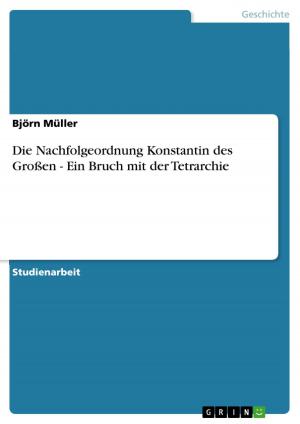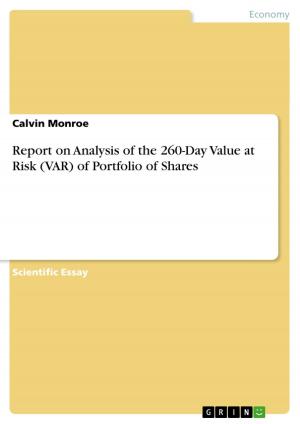Ambiguity in Shakespeare's History Play 'King Henry V'
Fiction & Literature, Literary Theory & Criticism, British| Author: | Michael Trinkwalder | ISBN: | 9783656199274 |
| Publisher: | GRIN Verlag | Publication: | May 25, 2012 |
| Imprint: | GRIN Verlag | Language: | English |
| Author: | Michael Trinkwalder |
| ISBN: | 9783656199274 |
| Publisher: | GRIN Verlag |
| Publication: | May 25, 2012 |
| Imprint: | GRIN Verlag |
| Language: | English |
Seminar paper from the year 2012 in the subject English - Literature, Works, grade: 1,00, Staatliche Berufliche Oberschule Fachoberschule / Berufsoberschule Kaufbeuren, language: English, abstract: 'King Henry V' has always been considered as Shakespeare's most patriotic play, one could even argue his most nationalistic play. 'King Henry V' appears to be the story of the ideal English king who is brave, charismatic, honourable and pious or as Shakespeare puts it, he is 'the mirror of all Christian kings' who fights for what is righteously his and leads his 'band of brothers' to victory against impossible odds. However, to truly understand Shakespeare's motivations, we have to take a look at the tumultuous time in which the play was written. Under the reign of Elizabeth I., England had either been at war or at the constant threat of one for decades. It was a time of frequent conspiracies to overthrow the queen and bloody rebellions. In this context the play can be seen as an attempt to raise the morale and to rally the English around a common cause. This interpretation becomes plausible given the fact that the play's popularity increased whenever England was threatened, for example in both world wars and the Napoleonic wars. Nevertheless 'King Henry V' is not just simple wartime propaganda, it's an ambiguous play which can be interpreted both as a glorification of war or alternatively as a subtle critique of the cruelty and futility of war. It lies entirely in the eye of the beholder. Someone with a patriotic point of view might identify himself with the virtuous Henry or admire that - although weakened by plague and famine - the English soldiers and their king defeats a superior French army, whereas a more critical reader might question the legitimacy of waging a war of aggression in the first place. Furthermore particularly modern readers feel disgusted by the killing of the unarmed prisoners at the battle of Agincourt. Nowadays it would be considered a war crime and even back then it was considered inhumane. On the one hand Shakespeare seems to show the ideal monarch and an English nation united in victory, on the other hand he shows the ugly face of war with all his atrocities and inhumanity. In the following essay I will show both, the patriotic and a more critical perspective and the reason why Shakespeare implemented both of them in his play.
Seminar paper from the year 2012 in the subject English - Literature, Works, grade: 1,00, Staatliche Berufliche Oberschule Fachoberschule / Berufsoberschule Kaufbeuren, language: English, abstract: 'King Henry V' has always been considered as Shakespeare's most patriotic play, one could even argue his most nationalistic play. 'King Henry V' appears to be the story of the ideal English king who is brave, charismatic, honourable and pious or as Shakespeare puts it, he is 'the mirror of all Christian kings' who fights for what is righteously his and leads his 'band of brothers' to victory against impossible odds. However, to truly understand Shakespeare's motivations, we have to take a look at the tumultuous time in which the play was written. Under the reign of Elizabeth I., England had either been at war or at the constant threat of one for decades. It was a time of frequent conspiracies to overthrow the queen and bloody rebellions. In this context the play can be seen as an attempt to raise the morale and to rally the English around a common cause. This interpretation becomes plausible given the fact that the play's popularity increased whenever England was threatened, for example in both world wars and the Napoleonic wars. Nevertheless 'King Henry V' is not just simple wartime propaganda, it's an ambiguous play which can be interpreted both as a glorification of war or alternatively as a subtle critique of the cruelty and futility of war. It lies entirely in the eye of the beholder. Someone with a patriotic point of view might identify himself with the virtuous Henry or admire that - although weakened by plague and famine - the English soldiers and their king defeats a superior French army, whereas a more critical reader might question the legitimacy of waging a war of aggression in the first place. Furthermore particularly modern readers feel disgusted by the killing of the unarmed prisoners at the battle of Agincourt. Nowadays it would be considered a war crime and even back then it was considered inhumane. On the one hand Shakespeare seems to show the ideal monarch and an English nation united in victory, on the other hand he shows the ugly face of war with all his atrocities and inhumanity. In the following essay I will show both, the patriotic and a more critical perspective and the reason why Shakespeare implemented both of them in his play.















